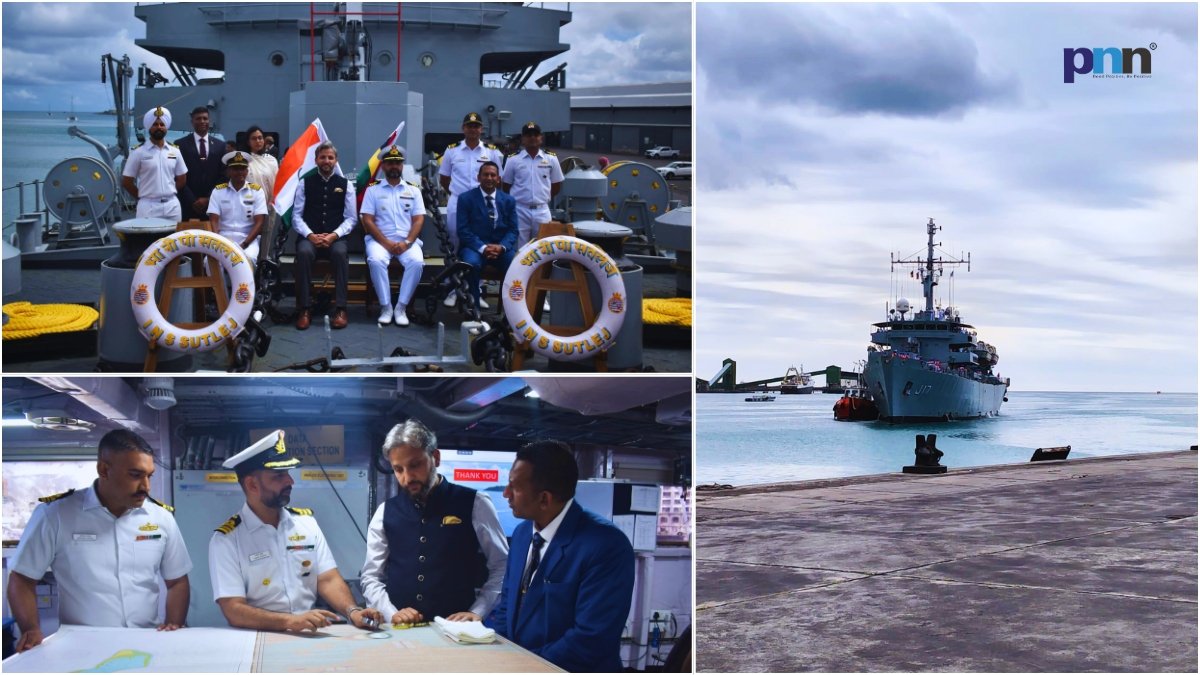New Delhi [India], October 2: India just dropped a serious maritime flex. INS Sutlej, the Navy’s hydrographic ace, has docked in Mauritius for the 18th joint survey, reaffirming India’s strategic and scientific grip over the Indian Ocean.
INS Sutlej Touches Down in Port Louis
On 29 September 2025, INS Sutlej, a specialised hydrographic survey vessel of the Indian Navy, arrived at Port Louis, Mauritius. This marks the 18th joint hydrographic survey between the two nations. The mission underscores decades of maritime coordination and deepening strategic trust.
The vessel isn’t just a floating gadget-lab; it’s a platform for cutting-edge ocean mapping, ensuring safe navigation and sustainable marine resource management in a region that’s more geopolitically crucial than ever.
The Mission Scope
INS Sutlej is set to cover roughly 35,000 square nautical miles, that’s a swath of the Indian Ocean that could easily make a geography quiz sweat. The mission involves comprehensive hydrographic data collection, mapping seabeds, and updating navigational charts.
For Mauritius, this isn’t just tech-wizardry on display. Officers from multiple ministries are boarding the ship for hands-on training in hydrographic survey techniques. It’s capacity-building with a serious wow factor. By the end of this mission, Mauritius will have homegrown experts who can handle ocean data like pros.
Bilateral MoU Drives Longstanding Cooperation
This survey isn’t a one-off stunt. It’s part of a framework laid down by the bilateral MoU on Hydrography, formalised during the 14th Joint Committee Meeting earlier this year. India and Mauritius have a history of syncing their oceanographic strategies, and the MoU cements that operationally.
Think of it as a VIP pass to the Indian Ocean: joint hydrographic missions, shared data, and mutual training. It’s a classic example of strategic diplomacy through science.
Beyond the Charts – Strategic Significance
While mapping oceans sounds nerdy, the implications are anything but. For India, the Indian Ocean Region (IOR) is more than a playground; it’s a chessboard. INS Sutlej’s deployment signals India’s intent to maintain navigational safety, safeguard ocean resources, and ensure a collaborative regional presence.
Mauritius benefits too. With updated charts and trained personnel, the island nation gains greater control over its waters and strengthens its maritime resilience. That’s smart, scalable capacity building in action.
Regional Maritime Collaboration
The Indian Ocean is a hotspot for commerce, security, and climate-sensitive research. Missions like these aren’t just about bilateral PR; they’re about enhancing regional collaboration, mitigating maritime risks, and supporting sustainable oceanic management.
In plain terms: India sends a ship, Mauritius gets skills, both countries score points in maritime strategy, and the Indian Ocean becomes a bit safer for everyone.
Capacity Building in Action
INS Sutlej doubles as a floating classroom. Mauritian officers are learning hydrographic data collection, charting techniques, and processing methods directly onboard. This hands-on approach ensures that training isn’t theoretical; it’s mission-ready.
It’s also a subtle flex: India doesn’t just patrol oceans; it transfers knowledge. That’s strategic influence, dressed as scientific collaboration.
A Reaffirmation of Strategic Ties
Every wave INS Sutlej maps is a statement: India and Mauritius are in this together. The deployment reiterates the two nations’ shared commitment to scientific excellence, maritime safety, and sustainable resource management.
From an Indian perspective, these missions are proof that strategic relationships are built on substance, not just ceremonies. A 35,000-square-nautical-mile survey isn’t just work; it’s credibility in action.
Looking Ahead
The Indian Ocean is only going to get hotter, geopolitically, economically, and environmentally. Future missions will likely build on this foundation, integrating newer tech, deeper oceanographic data, and expanded regional cooperation.
INS Sutlej’s arrival in Mauritius is a reminder: in the Indian Ocean, being proactive beats being reactive. And India, for now, is playing proactively like a boss.

